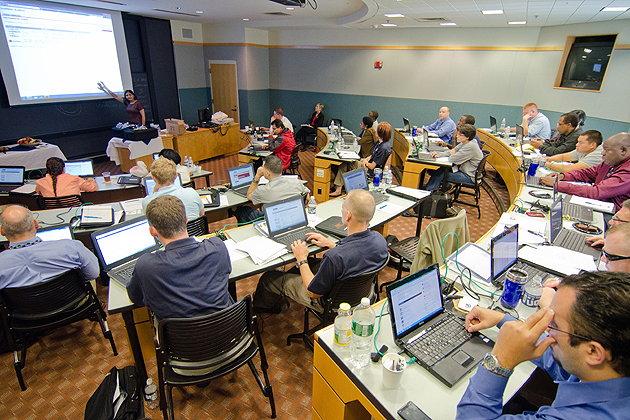
The idea first crossed Patrick Nelligan’s mind in 1999 during a visit to Arizona, and it was reinforced when he served in Kuwait for the U.S. Army in 2002. He even built his creation, a sleeve that protects windshield wipers, and created a website for it. Still, when he had an opportunity to join UConn’s Entrepreneurship Bootcamp for Veterans With Disabilities (EBV) he jumped at the chance.
“I needed a kick in the butt,” he says. “I have inventory, a patent is pending, I know how I want it to look, but I can’t get out of my own way. I need help putting together a strategic plan, impact marketing.”
Nelligan, a Bristol resident, has been and will continue to receive that help as UConn opens its doors to 25 participants for the 2011 EBV program, including the first six Connecticut residents to participate at UConn, along with residents of Rhode Island and New Hampshire. The University was awarded a charter last year but, due to a late start, didn’t have time to recruit locally.
EBV is a consortium of seven business schools nationwide that offer disabled veterans a multifaceted program, free of charge, to give them the skills needed to realize their entrepreneurial ideas. The program includes a four-week online course, an intensive nine-day on-campus experience, and an ongoing mentoring program as the veterans work to make their ideas reality. It is supported by a three-year, $450,000 grant from the U.S. Small Business Administration’s Office of Veterans Business Development.

UConn is the only participating university in New England. The on-site portion of this year’s program began Sept. 23, and runs through Oct. 1, when the 25 service members will graduate during ceremonies at the Connecticut Convention Center. William Simon ’80, ’82, CEO of Wal-Mart USA, will be the keynote speaker.
Nelligan, a 30-year serviceman who had tours in Iraq and Kuwait, devised his idea while spending time in those overheated climates, and spending the rest of his life in Bristol, Conn., where winters can be fierce. In each setting, he noticed that the windshield wipers on cars, trucks, or even Humvees wear out prematurely due to conditions. Hence the wiper booty, a rip-stop nylon and Velcro sleeve that slides over and protects wipers.
Among his early customers is the Connecticut National Guard, which is willing to test the blade covers on their vehicles, but the red tape and paperwork involved is overwhelming, he says. During the program, he’ll receive help in that regard, primarily by Michael Zacchea, a retired lieutenant colonel in the Marines who directs UConn’s program.

“EBV is a wonderful program,” says Zacchea, who was badly injured during a tour of duty in Iraq. “A lot of servicemen, especially disabled servicemen, have trouble transitioning into a ‘regular’ job once they return from overseas. But many of them have ideas that can translate into a small business, providing support for the veteran and his or her family.”
Joseph Nunez, a 2010 graduate of UConn’s inaugural program, is among that group. The San Antonio, Texas, resident started a laundry pick-up and delivery service, The Laundry Butlers: his company picks up people’s laundry then returns the fresh product, clean and tightly wrapped. Nunez came back to Storrs this year to help EBV organizers.
“Business is good,” Nunez says. “It was a little rocky at first, but it’s really starting to get legs.”
Sean Davis of Dayville hopes to start a steak restaurant in his hometown, part of Killingly, an area with very few restaurants.
“I’d like to open something like that, but also make it someplace with atmosphere, a place that’s a little more alive. Everybody’s so down with the economy and the wars, jobs, all the other problems. I want to see smiles on people’s faces,” he says. “And that has to start with the wait staff. If they’re smiling and working hard, the customer will smile, too.”
The program is funded by the EBV Foundation and its partners, including the U.S. Small Business Administration, PEPSICo, American Corporate Partners, and others. Locally, a number of Connecticut businesses, including a number of firms run by UConn alumni, have pitched in to help UConn’s program, either with donations or by teaching and mentoring. That group includes Brooks Bros. of Windsor, which donates suits to the veterans; TopCoder of Glastonbury; Foresight Tech of Hartford; and Apex Growth of Hartford. National brands pitching in include Dell, Microsoft, Bank of America, and Raytheon.
Other members of the consortium include the Whitman School of Management at Syracuse University, the founding member; the Mays Business School at Texas A&M; UCLA’s Anderson School of Management; Florida State University’s College of Business; the Stephenson Entrepreneurship Institute at Louisiana State University; and the Krannert School of Management at Purdue University.


